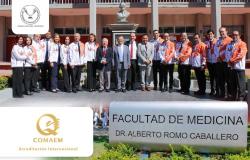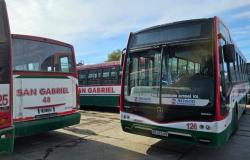The first stakes delimit the spaces of production and coexistence, while the raised flag indicates a new stage on the road to the food sovereignty of our America. In the old herd La Vergareña, the new Patria Grande del Sur commune, Bolívar state, Venezuela, The movement of workers and worked without land in Brazil (MST) does not come to demand the expropriation of land: that was already Hugo Chávez many years ago. This time, it is about fulfilling another of its main tasks: expanding the production of healthy foods, strengthening the basic organization and building a sustainable relationship with the environment.
Also read:
MST in Venezuela: Install International school of Agroecology in Patria Grande del Sur
For Rosana Fernandes, MST political Coordinator in Venezuela, this mission has a lot to do with what The movement has been building throughout its 41 years of struggle for agrarian reform: «when we assume a challenge from this perspective, we understand that it is why the MST has been implementing and doing; demonstrating the possibility of turning a territory into a space of life, of dignity, food, education, training, people living with dignity, which corresponds to the society project that we are building«.
The context of the Patria Grande del Sur project, and the way in which it has been carried out, differs quite a lot from the experience that the No land in Brazil.
When occupying unproductive haciendas, they usually face armed landowners, when not to the repression of state forces, and the risk of seeing destroyed the little that has been achieved. Here, no. Land occupation was promoted by President Nicolás Madurowhich put no less than 180,000 hectares under the coordination of the movement.

The Bolivarian government has also called three ministries to collaborate in structural and productive issues day to day, making possible what is intended to become the largest agroecological project of the continent led by a social movement. In Venezuela, this initiative is part of a series of public policies aimed at increasing food production to resist economic blockade, as well as to improve the quality of the products offered to the people, through agroecological transition.
Altamir Bastos, Agricultor and Settled of the MST that has been in Venezuela since January, Analyze the situation with some optimism: «I think the challenges here are much lower than in Brazil. Because here there is a different and more advanced organizational process, I would say, which are the communal advice (…) and there is also a government that intends to advance the revolutionary process. That is what changes everything! So I think there are … certainly there are difficulties here, perhaps access to some teams, but collectively this is resolved ».
It is important to note that part of these lands already have residents and producers who will in no way be threatened. On the contrary, they will be part of the project, benefiting from technical and organizational advice in order to guarantee their rights and improve their living conditions. After all, the Venezuelan people are the protagonist of this process. And if someone doubts it, it is worth stressing that the Brazilians who temporarily left their home to join this immense task have no claim on these lands.
“No, the MST did not come to occupy lands!”, Ironiza Gessica Lima, a young militant and technique in agroecology and daughter of camping. «We do not want to turn Venezuela into Brazil! Because Venezuela is already much more advanced than Brazil in this issue. We are here because, in addition to taking seriously one of our principles of solidarity among the peoples, we also want to understand the process of the Bolivarian revolution. We want to drink from this source. How do we also build this process there? So the MST is here to make this exchange and understand what this process of organizing the base is like, ”he says.
In total, there is Five communal tips In the territory, occupying 28,000 hectares With some 500 familiesy three indigenous communities which in turn have 19,000 hectares. Besides, 24,000 hectares are already cultivated – Conventionally – by Agrofamba State Agrifood Company Directed by the Army. He MST Brigade Coordinator in Bolívar, Fred Santanaexplains that they will develop two parallel work fronts: On the one hand, the production and training in spaces managed directly by the movement, and on the other, the Visits and the support of technicians In local peasant communities.
“The idea is that the MST provides this support from experience, to contribute to the process of production of healthy foods,” Santana points out. For the coordinator, where there is already production, the idea is to help boost the «Ecological transition from communities.»
He First group that was installed in the Patria Grande del Sur commune in mid -January He spent more than two months knowing the territory, studying its dynamics and listening to the population. This April, an internationally symbolic month in the struggle for land and agrarian reform, began to give life to the project, reproducing what the movement does better: a camp with militants and families in a remote and currently unproductive area, with the aim of raising an agroecology school.

The space will have a native plant nurseryand Creole seed bank and with one agricultural production area itselfincluding the Animal breedingwith a view to not only self -sufficiency of the group, but also to the implementation of “vitress” and experimental plots. The main methodology adopted will be the agroforestry system, which proposes to sow a diversity of crops on the same plot, with the ground covered and without use of fire or pesticides.
In this regard, Géssica Lima points out: «We are trying to convey to people that school is the camp itself. Talking about agroecology is this movement that we are doing. It is to build a baroraco. Because from the construction of a ravine, we can organize a group, we can organize people and agroecology is this movement. It is popular unity, it is strength, it is this process of solidarity, of companionship. So our school proposal does not begin with a physical structure, it begins with the idea, it materializes the idea, which is agroecology«.
Also read:
MST in Venezuela: «We come to collaborate with a sovereign project»
Another important challenge will be the commercialization of the products of the entire commune, from new distribution circuits, For food to really reach the dishes of Venezuelans, at an affordable price and with a fair remuneration for the farmer.
This demand has emerged precisely from the communal councils, which claim to have difficulties in this area due to structural transport problems and the quality of the roads. If social movements do not have keys in hand to resolve all these issues, they can reinforce popular power in the search for solutions. But for Fred Santana, Marketing is an intrinsic part of the transformation process that is being implemented.
“Agroecology is based on a different approach, which is diversified crop, so it needs to create a different marketing dynamic, with a more participatory anchor, which on the one hand is also a potential, since the structure of the communal councils and the communes in Venezuela allows some type of exchange, of direct commercialization between those they produce and those they consume”, Santana points out.
This fundamental dialogue with the communal people and with local producers, will be seen Facilitated by the active participation of the Common Union In the project. Since its foundation, this young Venezuelan social movement has forged strong links with its Brazilian brother. And MST himself, present in Venezuela for twenty years with his internationalist brigade, has been contributing to various territories organized by Comuneor Union.
Member of the Venezuelan Brigade that came to join the process, Jesús Marchán See many Common points between the two movements: «We agree that the road is for production, that the way is to give power to our people. We agree on several things, which is what leads us to unite more every day, not only from the international issue, but also from the formative, political, productive issue, so that here we can take the true healthy foods to our people, and that it is our people who know that these foods belong to them«.
In this exchange between producers and activists of different realitieseveryone affirms that they have more to learn than to contribute. Over the years, it is likely that many people from different countries contribute to this collective construction, expanding and improving production and experimentation. But it is also expected that Venezuelan families from other locations and states can find in the Patria Grande del Sur commune a place to live with dignity and in harmony with nature.
Altamir Bastos summarizes it like this: «That’s what the MST came, to cooperate, to bring people, activists, who came to cooperate with Venezuelans and we will take a lot of experience. From here, what we are going to do, what we are going to bring, we will improve even more ».
Autor: Televel – Cha Dafol – NH





